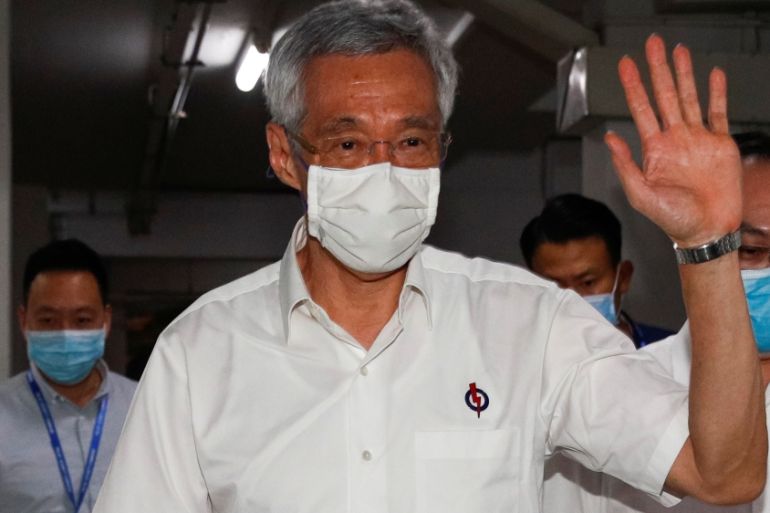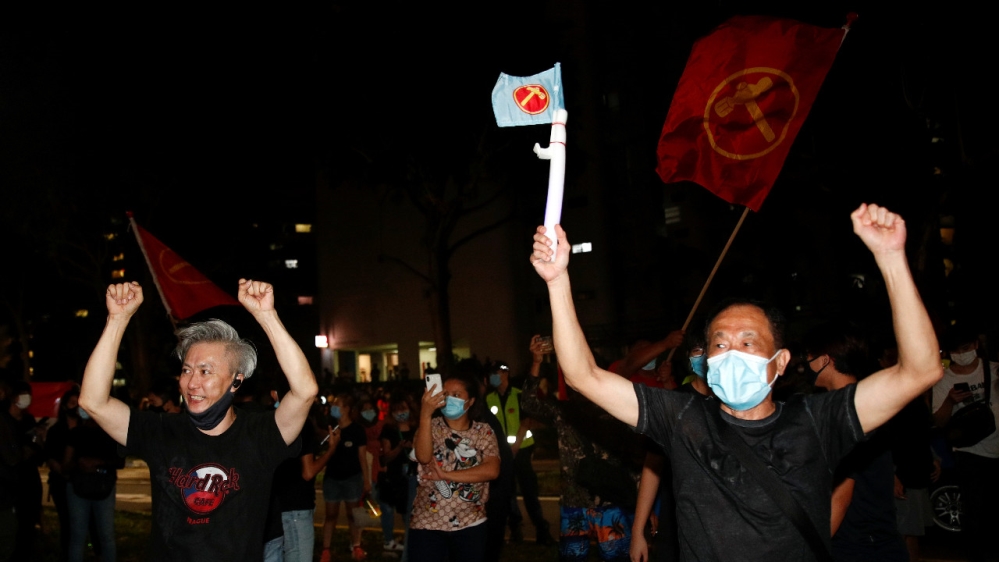Singapore’s governing PAP returns to power but faces setback
Governing party comfortably wins election but opposition Workers Party increases its seats in Parliament from six to 10.

Singapore’s governing People’s Action Party (PAP) extended its unbroken rule in Friday’s election, but its vote share slipped as opposition parties made historic inroads in a ballot held under the cloud of the COVID-19 pandemic.
Having held power since independence in 1965, the PAP had been widely expected to win and carry Prime Minister Lee Hsien Loong to what is likely his last victory before retirement as the national leader.
Keep reading
list of 4 itemsNorth Macedonian elections set to test EU ambitions
John Swinney elected as new Scotland leader
Stormy Daniels testifies during day 13 of Trump’s New York hush money trial
The PAP secured 83 out of 93 seats in Parliament. But the main opposition Workers’ Party won the other 10, the most ever won by the opposition, while the PAP’s popular vote fell to 61 percent, down from 70 percent in 2015.
Several key PAP leaders also lost, including two former ministers.
“It’s not as strong a mandate as I hoped for but it’s a good mandate,” Lee told a news conference on Saturday.
“The results reflect the pain and uncertainty that Singaporeans feel in this crisis … this was not a feel-good election but one where people are facing real problems and expect more rough weather to come.”

Bridget Welsh, a research associate at Malaysia’s University of Nottingham, told The Associated Press news agency the result was “a defeat” for PAP “in the Singaporean context”.
“Worst seat performance and loss of popular vote in an election that they called early in a pandemic mistakenly thinking the crisis would help them,” she said. “The PAP has a mandate but one that puts the party on notice that Singaporeans, especially young Singaporeans, expect more.”
‘Hit the ground running’
The PAP has dominated politics since 1959, when Lee’s father, Lee Kuan Yew, became Singapore’s first prime minister and built the resource-poor city-state into one of the world’s richest nations during his 31 years in office.
But it has also been criticised for tight government control, media censorship and use of oppressive laws and civil lawsuits against dissidents.
Lee, 68, has held the premiership since 2004 and had called the election to seek a fresh mandate to guide the country through a health crisis that has crushed the small but open economy.
The prime minister retained his seat easily. But his deputy and earmarked successor, Heng Swee Keat, won his seat with a slim 53 percent of the vote in what analysts said was a key test of his public support.
On Saturday, Lee acknowledged that citizens, especially the younger generation, want more opposition voices in Parliament. He said Workers’ Party chief Pritam Singh will officially be named opposition leader, an unprecedented move in the city-state.
Two more non-constituency seats will be offered to top opposition losers to bring the opposition block to 12 seats, as provided for under the law, he said.
|
|
In the Workers’ Party strongholds, streets swelled with supporters honking horns, cheering and waving party flags – some seemingly paying little heed to social distancing rules.
“I’m very grateful to all the voters, I’m also very humbled,” said Singh.
“Today’s results are positive but we have to hit the ground running. We should not get over our head with the results,” he added.
Polling was extended on Friday by two hours until 10pm (14:00 GMT) after strict safety measures in place for the pandemic delayed voting at some stations.
The Election Department also dropped a requirement that disposable gloves be worn during voting to cut waiting time.
Apart from wearing masks and having their temperature checked, groups of voters were each allotted a two-hour slot to cast their ballots to spread out the process and reduce crowding, with senior citizens given priority in the first four hours.
Election officials wore full protective gear and polling booths were sanitised every half hour. People treated for COVID-19 or under quarantine at home were not allowed to vote.
Voting in Singapore is compulsory and turnout at Friday’s election was 96 percent.